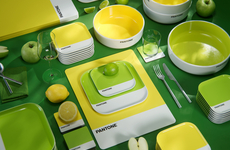
HONOKA LAB Presents the TATAMI ReFAB PROJECT
Amy Duong — June 26, 2024 — Art & Design
References: honoka-lab.jp & yankodesign
HONOKA LAB unveils a look at the TATAMI ReFAB PROJECT furniture series which is led by a team of product designers working with 3D printing technology. The studio is working on new ways to create traditional Japanese tatami mats whilst retaining the heritage with premium technology.
Japanese interiors have often been detailed with tatami mats for the past centuries due to their aromatic sensibilities and humidity regulation. The lab is working to integrate these traditional advancements with the intricacies of modern design. The recycled tatami is blended with biodegradable plastic to form a sustainable material that is adaptable and durable. The composite can be 3D printed to form decorative home products connected to the roots of Japanese culture.
Image Credit: HONOKA LAB
Japanese interiors have often been detailed with tatami mats for the past centuries due to their aromatic sensibilities and humidity regulation. The lab is working to integrate these traditional advancements with the intricacies of modern design. The recycled tatami is blended with biodegradable plastic to form a sustainable material that is adaptable and durable. The composite can be 3D printed to form decorative home products connected to the roots of Japanese culture.
Image Credit: HONOKA LAB
Trend Themes
1. 3d-printed Sustainable Furniture - Innovative use of 3D printing and biodegradable materials creates eco-friendly furniture blending tradition with technology.
2. Cultural Heritage in Modern Design - Integrating traditional Japanese tatami mat designs with contemporary aesthetics preserves cultural heritage while advancing interior design.
3. Biodegradable Composite Materials - New biodegradable composites derived from recycled materials offer durability and adaptability in sustainable home product manufacturing.
Industry Implications
1. Home Furnishings - Eco-conscious consumers drive the demand for sustainably made furniture incorporating traditional cultural elements.
2. 3D Printing Technology - Advances in 3D printing enable the creation of intricate, custom-made home products using biodegradable and recycled materials.
3. Sustainable Materials - The market for sustainable materials expands as industries seek eco-friendly alternatives for product manufacturing.
5.8
Score
Popularity
Activity
Freshness
















